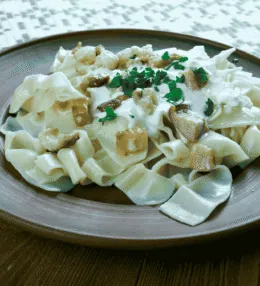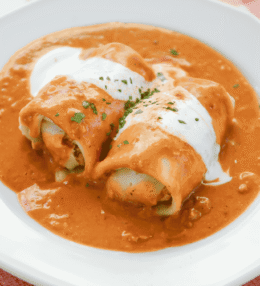
- View
Table of Contents
ToggleGalbi, South Korea’s iconic grilled rib dish, is more than just a meal, it’s an experience that celebrates bold flavours and communal dining. This marinated barbecue specialty, often prepared with beef or pork ribs, is cherished for its tender, smoky, and slightly sweet profile.
Whether sizzling on a table top grill or enjoyed at a bustling Korean barbecue restaurant, Galbi embodies the essence of South Korean cuisine: flavourful, social, and deeply satisfying.
Want to dive deeper into Korean Cuisine? Don’t miss our post on 17 Traditional Korean Foods to Try
What Is Galbi?
Galbi, which translates to “ribs” in Korean, is a dish that showcases the art of marinating and grilling. Traditionally made with beef short ribs (so-galbi), the meat is marinated in a flavourful mixture of soy sauce, sugar, garlic, sesame oil, and other aromatic ingredients.
This marinade tenderizes the ribs while infusing them with a perfect balance of savoury and sweet flavours. What sets Galbi apart is the unique way the meat is prepared. For LA galbi, the ribs are cut thinly across the bone, making them ideal for quick grilling and easy eating.
Alternatively, wang galbi features thicker cuts that are butterflied to maximize surface area, allowing the marinade to penetrate deeply. The ribs are grilled over charcoal or gas, resulting in a smoky, caramelized exterior that contrasts beautifully with the juicy, tender meat inside.
Galbi is typically served with an array of side dishes, or banchan, and is best enjoyed wrapped in lettuce with a dab of spicy ssamjang (fermented soybean paste) and a slice of garlic.
Ingredients and Taste
The magic of Galbi lies in its marinade, which is as much about the technique as the ingredients. The base is soy sauce, sugar, and sesame oil, creating a foundation that’s both savoury and slightly sweet.
Garlic and ginger add warmth and depth, while grated Asian pear or kiwi is often included to tenderize the meat and enhance the sweetness naturally. Green onions, black pepper, and a splash of rice wine or mirin round out the flavour profile, ensuring that every bite is complex and deeply satisfying.
On the grill, Galbi transforms. The sugar in the marinade caramelizes, creating a glaze that clings to the ribs, while the sesame oil and garlic release aromatic waves of smoky, nutty richness.
The result is meat that’s tender yet slightly chewy, with a flavour that balances sweet, salty, and umami notes. The texture and taste make Galbi a standout dish that’s both indulgent and comforting, perfect for sharing with friends and family.
A Taste of History
Galbi’s origins are deeply rooted in South Korea’s rich culinary heritage, where grilling and communal meals have long been central to the culture. Historically, beef was considered a luxury, reserved for special occasions.
The development of marinated ribs allowed cooks to tenderize tougher cuts of meat, transforming them into something extraordinary. Over time, Galbi evolved from a dish of necessity into a celebrated delicacy, becoming a cornerstone of Korean barbecue.
The dish’s preparation and consumption also reflect the importance of togetherness in Korean dining. Galbi is rarely eaten alone, it’s meant to be cooked and shared at the table, fostering connection and conversation.
The sizzling sound of ribs on the grill and the mingling aromas of smoke and marinade create an atmosphere that’s as enjoyable as the food itself.

Korean Galbi (Grilled Ribs)
Equipment
- Mixing bowl
- Grater
- Knife
- Grill or oven broiler
- Tongs
- Basting brush
- Serving platter
Ingredients
For the Marinade:
- 1/2 cup soy sauce
- 1/4 cup brown sugar
- 2 tablespoons honey
- 3 garlic cloves minced
- 1 medium onion grated
- 1 small Asian pear grated (or substitute with 1/4 cup pear juice)
- 2 tablespoons sesame oil
- 1 tablespoon rice wine mirin
- 1 teaspoon black pepper
- 1 teaspoon sesame seeds
For the Ribs:
- 1.5 kg about 3 lbs beef short ribs, flanken cut (cross cut style)
- 1 green onion finely chopped (for garnish)
- Sesame seeds for garnish
Instructions
- To begin, prepare the marinade. In a large mixing bowl, combine soy sauce, brown sugar, honey, minced garlic, grated onion, grated Asian pear, sesame oil, rice wine, black pepper, and sesame seeds. Whisk thoroughly until the sugar is dissolved, creating a smooth and fragrant marinade.
- Prepare the ribs by rinsing them under cold water to remove any bone fragments. Pat the ribs dry with a clean kitchen towel. Use a sharp knife to score the meat lightly, creating shallow cuts to help the marinade penetrate more deeply. This step ensures that the flavours infuse evenly throughout the ribs.
- Submerge the ribs in the marinade, ensuring each piece is fully coated. Use your hands to massage the marinade into the meat for an even distribution of flavour. Cover the bowl with plastic wrap or transfer the ribs and marinade to a sealable plastic bag. Refrigerate for at least 4 hours, preferably overnight, to allow the flavours to meld.
- When ready to cook, remove the ribs from the refrigerator and allow them to come to room temperature for about 30 minutes. This helps the meat cook evenly. Preheat your grill to medium-high heat (or preheat an oven broiler if grilling is not an option).
- Oil the grill grates lightly to prevent sticking. Place the ribs on the grill, reserving the marinade for basting. Cook for 3-4 minutes per side, turning occasionally. Brush the reserved marinade onto the ribs during the last few minutes of cooking to enhance the caramelized flavour. If using an oven broiler, cook the ribs on a wire rack set over a baking sheet, turning and basting as needed.
- Check the ribs for doneness. They should be slightly charred on the edges with a juicy interior. Avoid overcooking, as the ribs can become dry. Use a meat thermometer if needed, aiming for an internal temperature of 65°C (150°F).
- Transfer the cooked ribs to a serving platter. Let them rest for 5 minutes to allow the juices to redistribute, ensuring each bite is flavourful and tender.
- Serve the Galbi garnished with chopped green onion and a sprinkle of sesame seeds. Pair with steamed white rice, kimchi, and lettuce leaves for wrapping. For an authentic experience, offer ssamjang (Korean dipping sauce) on the side. Arrange the platter neatly for a visually appealing presentation that celebrates the dish’s rich heritage.
Nutrition
You May Also Like








